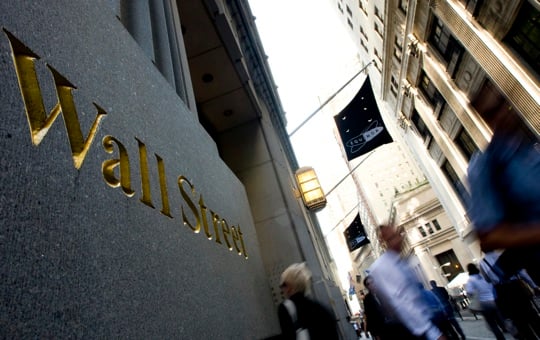Correlation between consumer optimism and strong market performance no longer applies; why is that?
Main Street is out of step with Wall Street.
The Bloomberg Consumer Comfort Index has stalled near its recession average as the Dow Jones Industrial Average has risen 83 percent from a 12-year low in March 2009. A tight correlation between the index and Dow that lasted more than two decades has broken down as joblessness above 9 percent, stagnant wages and near $4-a-gallon gasoline outweigh the benefits of higher share prices, even after a 6.6 percent retreat in the Dow since the end of April.
“Consumers are fairly depressed, yet the stock market continues to improve,” Guy LeBas, chief fixed-income strategist at Janney Montgomery Scott LLC in Philadelphia, said in an interview. “It's foreign demand that is really pushing corporate profitability. Consumer confidence is pretty constrained by the labor market.”
U.S. manufacturers in particular have profited from faster growth in emerging economies, including Colombia and Indonesia, where expanding middle classes are demanding more roads and utilities, as well as higher-protein foods and more consumer goods. Deere & Co., the world's largest farm-equipment maker, raised its fiscal 2011 earnings forecast on May 18 to $2.65 billion from $2.5 billion, citing increased demand for farm and construction machinery outside the U.S, along with growth in America.
Shares of the Moline, Illinois-based company have jumped 219 percent to $79.27 yesterday from $24.83 on March 2, 2009, even after sliding 20 percent from a high of $99.24 on April 4. Half its business will come from overseas by 2018 compared with about 40 percent now, driven by “big opportunities in markets like Russia and South America,” Marie Ziegler, the company's treasurer, said on a June 7 conference call.
‘Margins Intact'
U.S. corporations have gotten “a pickup in sales growth, but they're not responding with a big pickup in wages and labor growth,” said Rob Carnell, chief international economist at ING Bank in London. “This is helping them to keep their margins intact in the backdrop of rising commodity prices.”
Wages and salaries made up 48.9 percent of gross value- added for domestic businesses in March, according to Commerce Department data. That's up slightly from 48.7 in December, the lowest since records began in 1929. Meanwhile, corporate profits posted a sixth quarterly gain in January-March this year from a year earlier.
The 18-month recession shaved 4.1 percentage points off gross domestic product before ending in June 2009, making it the deepest downturn since the 1930s. Growth has averaged about 2.8 percent since then, enough to restore only 1.8 million of the 8.8 million jobs lost as a result of the slump.
Rising Unemployment
The economy generated 54,000 positions in May, the fewest in eight months and down from 232,000 in April, while the unemployment rate rose to 9.1 percent, the Labor Department reported June 3.
“Now that there is a delay in the job-market recovery, there is a delay in the confidence recovery,” said Jim Paulsen, chief investment strategist at Minneapolis-based Wells Capital Management.
Since the stock rally began in March 2009, the correlation between the Dow and Bloomberg's comfort index, a measure of consumer sentiment, has fallen to 0.36 compared with 0.82 since 1985, according to Langer Research Associates LLC in New York, which compiles the index for Bloomberg. A correlation of 1 indicates two variables are in lockstep; negative 1 means they move in opposite directions.
The index rose to minus 44 in the week ended June 12 from minus 45.9 and has averaged minus 46 since June 2009. That's below a minus 43 average during the slump and a clear sign some consumers aren't feeling the benefits of the recovery as much as companies and Americans who own their shares.
Falling Expectations
The Bloomberg Comfort Gauge of economic expectations dropped to minus 31 this month, the lowest level since March 2009, from minus 16 in May, the latest report showed yesterday.
Confidence among households making between $40,000 and $49,999 a year has averaged minus 46 since the recession ended, compared with minus 7.3 for people making more than $100,000 a year, who are most likely to be more-active stock owners. A reading of less than zero is negative.
“Higher-income people have greater exposure to the markets” while lower-income Americans are more focused on the “kitchen-table” issues of high unemployment and stagnant wages, said Gary Langer, president of Langer Research.
Eighty-seven percent of Americans who make $75,000 or more a year own stocks, according to a Gallup poll conducted April 7-11. That compares with 54 percent of all Americans, the lowest share since Gallup began monitoring the data annually in 1999.
‘Hesitant' Investors
“Even as stocks have surged over the past couple of years, it has been hard for most Americans to understand what is happening on Wall Street and why, leaving them hesitant to invest,” Dennis Jacobe, Gallup's chief economist, said in an April 20 statement.
Weekly earnings adjusted for inflation fell about 10 percent between 1979 and 2009 for the 74 percent of consumers without a college degree, compared with a 20 percent increase for people with a bachelor's degree or higher, according to Langer's research based on Labor Department data.
“There is a strong sense that the opportunity for prosperity is much diminished from previous generations,” Langer said. “If we wonder why so many people feel they're doing less well financially, it's because it's true.”
--Bloomberg News--







